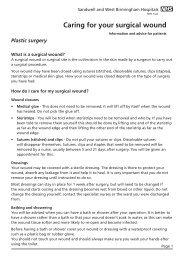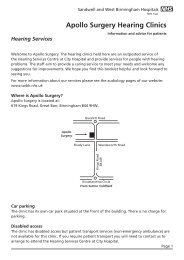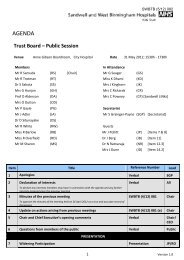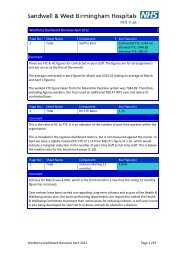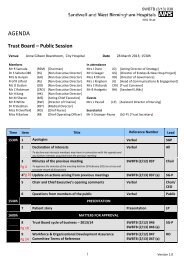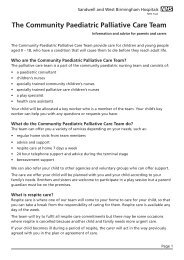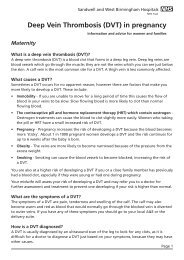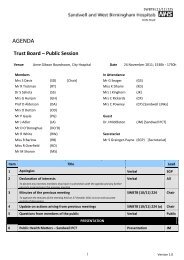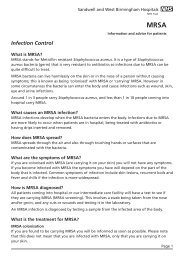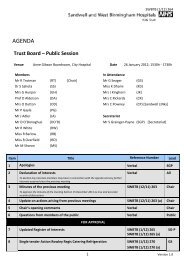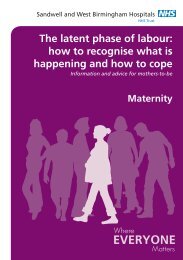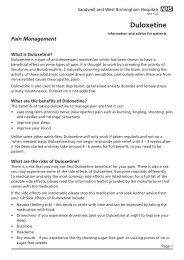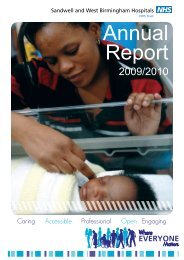Post Exposure Prophylaxis (PEP) for HIV - Sandwell & West ...
Post Exposure Prophylaxis (PEP) for HIV - Sandwell & West ...
Post Exposure Prophylaxis (PEP) for HIV - Sandwell & West ...
Create successful ePaper yourself
Turn your PDF publications into a flip-book with our unique Google optimized e-Paper software.
<strong>Post</strong> <strong>Exposure</strong> <strong>Prophylaxis</strong> (<strong>PEP</strong>) <strong>for</strong> <strong>HIV</strong><br />
Occupational Health & Wellbeing<br />
In<strong>for</strong>mation and advice <strong>for</strong> patients<br />
Please read this in<strong>for</strong>mation carefully be<strong>for</strong>e starting treatment, as the final decision on<br />
whether to have this treatment is yours. If you have any doubts or worries, or you are simply<br />
confused about something, ask your doctor.<br />
What is <strong>Post</strong>-exposure prophylaxis (<strong>PEP</strong>)?<br />
<strong>Post</strong>-exposure prophylaxis (<strong>PEP</strong>) is a treatment to reduce your chances of contracting <strong>HIV</strong><br />
(human immunodeficiency virus) after your possible exposure to it. It involves taking the<br />
following tablets by mouth, as prescribed:<br />
• Truvada (Tenofovir 245mg and Emtricitabine 200mg)<br />
• Kaletra (Lopinavir 200mg and Ritonavir 50mg)<br />
• Metoclopramide 10mg <strong>for</strong> nausea (feeling sick) if needed<br />
You will be given 6 days supply of <strong>PEP</strong> by either occupational health, A&E or the sexual<br />
health (GUM) department after they have assessed the risks of your exposure. You will be<br />
told how to get a further prescription as you need to take the medication <strong>for</strong> up to 4 weeks.<br />
To reduce the risk of exposing others to <strong>HIV</strong> during sexual intercourse please also use a<br />
condom until further medical checks are completed.<br />
What is the benefit of taking <strong>PEP</strong>?<br />
The benefit of taking <strong>PEP</strong> is that it can greatly reduce your risk of contracting <strong>HIV</strong> if it is<br />
taken soon after exposure to the virus. Although these tablets are not licensed specifically <strong>for</strong><br />
preventing <strong>HIV</strong>, they are licensed to treat <strong>HIV</strong>.<br />
What are the risks of <strong>PEP</strong>?<br />
These medicines can cause the following side-effects: Headaches, dry mouth, nausea,<br />
vomiting, diarrhoea, rash, tiredness, dizziness, tingling sensation, sleeplessness, cough, flulike<br />
symptoms, general pain or skin reactions.<br />
Less commonly, significant side-effects can occur after 4-6 weeks of treatment. Further<br />
in<strong>for</strong>mation about possible side-effects can be found in the manufacturer’s leaflet which<br />
comes with the medication.<br />
There is not sufficient evidence about the effect of these medications during pregnancy so<br />
pregnant women may still be advised to take them if the benefits outweigh the possible<br />
risks. Women who are breastfeeding should stop breastfeeding while taking these medicines<br />
or if found to be <strong>HIV</strong> positive.<br />
Page 1
<strong>Post</strong> <strong>Exposure</strong> <strong>Prophylaxis</strong> (<strong>PEP</strong>) <strong>for</strong> <strong>HIV</strong><br />
Occupational Health & Wellbeing<br />
In<strong>for</strong>mation and advice <strong>for</strong> patients<br />
What are the risks of not taking <strong>PEP</strong>?<br />
If you have had exposure to the <strong>HIV</strong> virus, there is a small risk that you may contract the<br />
virus. Taking <strong>PEP</strong> reduces this risk, so if you do not take <strong>PEP</strong> this risk is not reduced.<br />
Are there any alternatives to <strong>PEP</strong>?<br />
There is no alternative treatment to prevent <strong>HIV</strong> but if you are unable to tolerate the<br />
medication a <strong>HIV</strong> specialist may be able to adjust it.<br />
Be<strong>for</strong>e taking <strong>PEP</strong><br />
Be<strong>for</strong>e you start taking <strong>PEP</strong> please tell the doctor if you:<br />
• are taking any other medicines or vitamins<br />
• have a history of liver disease, kidney disease, blood disorders (such as anaemia), allergies<br />
and if you have ever had a reaction to any medicines<br />
• are pregnant or breastfeeding<br />
Be<strong>for</strong>e you start treatment the doctor may ask to take a sample of your blood. You will<br />
then need to have further blood tests at regular intervals to monitor your blood and liver<br />
function. Your doctor will advise you how often you need these blood tests and how long<br />
<strong>for</strong>.<br />
How to take the medication<br />
Please read the manufacturer’s leaflet that comes with the medication be<strong>for</strong>e taking it <strong>for</strong><br />
the first time. You should start this medication as soon as possible after exposure and take it<br />
<strong>for</strong> the next 4 weeks. Make sure you take the dose that has been prescribed.<br />
Truvada<br />
Take one tablet daily with food.<br />
• If you miss a dose take 1 tablet as soon as possible. If a dose is missed and it is nearly time<br />
<strong>for</strong> your next dose, only take 1 tablet, do not double the dose.<br />
• If you vomit less than 1 hour after taking Truvada, take another tablet. If you vomit after<br />
1 hour of taking Truvada do not take another tablet.<br />
Kaletra<br />
Take 2 tablets twice a daily, with or without food.<br />
• Do not chew, break or crush the tablets.<br />
• If you miss a dose take 1 tablet as soon as possible. If a dose is missed and it is nearly time<br />
<strong>for</strong> your next dose, only take 1 tablet, do not double the dose.<br />
Page 2
<strong>Post</strong> <strong>Exposure</strong> <strong>Prophylaxis</strong> (<strong>PEP</strong>) <strong>for</strong> <strong>HIV</strong><br />
Occupational Health & Wellbeing<br />
In<strong>for</strong>mation and advice <strong>for</strong> patients<br />
Metoclopramide<br />
Take 1 tablet, 3 times per day <strong>for</strong> nausea if needed.<br />
• Do not drink alcohol while taking this medication.<br />
• Women under the age of 20 should not take this medicine.<br />
Storing the medication<br />
• Keep these medications out of the sight and reach of children.<br />
• Store at room temperature.<br />
• Do not use after the expiry date.<br />
• Store them in the original packaging.<br />
• Keep packaging tightly closed.<br />
• Ask your pharmacist how to dispose of any medications.<br />
Follow-up<br />
You will be told what follow-up blood tests and appointments you need whilst taking this<br />
medication. If you experience any unpleasant side effects from the medication please contact<br />
the department that provided you with the medication or your GP so the treatment can be<br />
re-assessed.<br />
Further in<strong>for</strong>mation<br />
If you have any questions or concerns please contact the department that provided you with<br />
this medication by contacting the hospital switchboard and asking <strong>for</strong> them, or alternatively<br />
speak to your GP or local pharmacist.<br />
Hospital switchboard: 0121 554 3801<br />
For in<strong>for</strong>mation on <strong>HIV</strong> visit the Terence Higgins Trust website: www.tht.org.uk<br />
For more in<strong>for</strong>mation about our hospitals and services please see our website:<br />
<strong>Sandwell</strong> and <strong>West</strong> Birmingham Hospitals NHS Trust<br />
www.swbh.nhs.uk<br />
Page 3
<strong>Post</strong> <strong>Exposure</strong> <strong>Prophylaxis</strong> (<strong>PEP</strong>) <strong>for</strong> <strong>HIV</strong><br />
Occupational Health & Wellbeing<br />
In<strong>for</strong>mation and advice <strong>for</strong> patients<br />
Sources used <strong>for</strong> the in<strong>for</strong>mation in this leaflet<br />
• Health Protection Agency, ‘Eye of the needle’, November 2008<br />
• Department of Health, ‘<strong>HIV</strong> post-exposure prophylaxis: Guidance from the UK Chief<br />
Medical Officers’ Expert Advisory Group on AIDS’, September 2008<br />
• British National Formulary 62, section 5.3, ‘Antiviral drugs’, September 2011<br />
If you would like to suggest any amendments or improvements to this leaflet please contact the<br />
communications department on 0121 507 5420 or email: swb-tr.swbh-gm-patient-in<strong>for</strong>mation@nhs.net<br />
A Teaching Trust of The University of Birmingham<br />
Incorporating City, <strong>Sandwell</strong> and Rowley Regis Hospitals<br />
© <strong>Sandwell</strong> and <strong>West</strong> Birmingham Hospitals NHS Trust<br />
ML3645<br />
Issue Date: February 2012<br />
Review Date: February 2014<br />
Page 4



